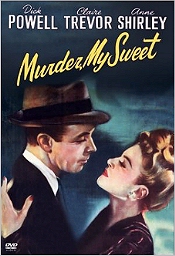 |
Murder, |
|---|
 |
Murder, |
|---|
|
Dick Powell - Philip Marlowe Claire Trevor - Helen Grayle Anne Shirley - Ann Grayle Otto Kruger - Jules Amthor Mike Mazurki - Moose Malloy Miles Mander - Mr. Grayle |
Edward Dmytryk - Director Adrian Scott - Producer John Paxton - Screenwriter Harry J. Wild - Cinematographer Roy Webb - Film Score Raymond Chandler - Original Novel |
The first two attempts to film Raymond Chandler were as bogus as the first two Dashiel Hammett adaptations. RKO purchased Chandler's second novel, Farewell, My Lovely, to serve as source material for a film called The Falcon Takes Over. In 1942, Fox bought Chandler's The High Window to provide a storyline for Time to Kill. Paying Chandler solely for his plots made as much sense as hiring Rita Hayworth just to do voice-overs. Eventually someone had to recognize the distinctive vision Chandler had of Philip Marlowe and Los Angeles.
That turned out to be Adrian Scott, a theatrical producer from New York just beginning his film career at RKO. The studio already owned Farewell, My Lovely, so it didn't have to pay Chandler another cent. That prompted executive producer Sid Rogell to give Scott the green light. Enlisting the aid of fledgling screenwriter John Paxton, a crony from New York, and director Edward Dmytryk, a bulwark of the studio's "B" features, Scott set to work producing the first faithful Chandler movie.
Murder, My Sweet, released in early 1945, pruned Chandler's plot within a mile or two of coherence, and smartly played up his strengths: attitude and ambiance. Marlowe (Powell) is hired to protect a client attemping to retrieve a stolen necklace. When the detective and his client show up to make the transaction, Marlowe is knocked out and the client murdered. Ann Grayle (Anne Shirley) discovers the body and eventually tells Marlowe that the necklace was owned by her step-mother (Claire Trevor). Mrs. Grayle claims that a quack psychiatrist, Jules Amthor (Otto Kruger), uses his racket to blackmail people, but on meeting with Amthor it is clear he is still after the jewels and he attempts to keep Marlowe from finding them first.
Dmytryk and cameraman Harry Wild established many of the visual motifs that would become noir standards: deep shadows cut by key light, unsettling angles (many lifted from Citizen Kane), a dreamy, hypnotic pace accelerating toward inevitable disaster. Scott and Paxton also understood that it was the reflective nature of the detective's first-person narration, weary with regret and resignation, that made these stores you could take personally. This is the essential distinction between the noir detective and other fictional sleuths. He may sove a case, but the answer to the big mystery, what he's really after, always eludes him. Following hard on the heels of Double Indemnity (1944, Billy Wilder), which Chandler scripted, Murder, My Sweet was the back end of a one-two punch that knocked filmgoers--and even more so, filmmakers--for a loop. After those two, things would be done a little differently around town.
Once Murder, My Sweet proved a hit, Jack Warner gave director Howard Hawks $50,000 to buy the rights to Chandler's first novel, The Big Sleep. Hawks called up Chandler and asked him if he'd like to see Humphrey Bogart as Marlowe. Chandler was as tickled as a kid at Christmas, and Hawks paid him five grand for the book rights, pocketing the remaining loot most probably to underwrite one hell of a hunting trip. Chandler and Hammett, like their hard-boiled alter egos, were soft when it came to money. Hammett got a decent payday for the film rights to The Maltese Falcon, but then spent years legally wrangling to regain control of the chartacter of Sam spade, not wanting to believe he'd sold off the name forever. When Chandler signed on as a studio writer in the Forties, he was so overwhelmed by his weekly retainer it never dawned on him to ask for what other, lesser, writers were earning.
Although Dick Powell did a fine job in Murder, My Sweet, he couldn't quite conceal his bouncy, hoofer's energy beneath a rash of stubble and a rumpled suit. He came off more petulant than world-weary. Closer to the real Chandler, perhaps, but wide of the romantic ideal. On the other hand, "Bogart was the genuine article," Chandler bubbled in anticipation of his Marlowe incarnation. Robert Mitchum, who enjoyed a noir revival in the Seventies, portrayed Philip Marlowe in remakes of Farewell, My Lovely (1975) and a British version of The Big Sleep (1978).
--EDDIE MULLER, from Dark City
The Lost World of Film Noir
A selection of Murder, My Sweet films.
|
Find Murder, My Sweet on eBay.com
A selection of Murder, My Sweet in books.
|
|
home: The Film Noir 'net |
back to: CLASSIC NOIR |
|
Any comments, additions or suggestions
should be addressed to: The Film Noir 'net / Eric B. Olsen / ericbolsen@juno.com |
Other Web Sites:
History of Horror Hard Bop Homepage The War Film Web Author Eric B. Olsen |